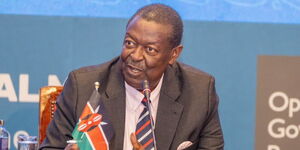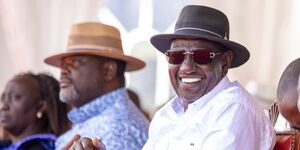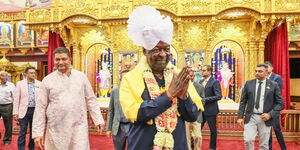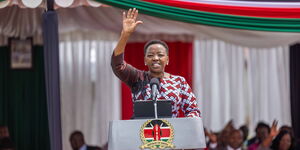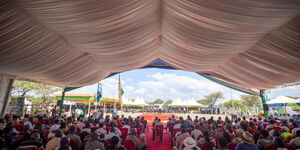President Uhuru Kenyatta has been on the spot over the past seven years, as Kenyans debated on whether or not his administration delivered on promises made in their 2013 ad 2017 campaigns.
The Jubilee government has been trying to push back the narrative that it has burdened Kenyans with soaring debt, a rising cost of living, and runaway corruption.
Among the achievements Jubilee has prided itself in, is the construction of the Standard Gauge Railway, the expansion of the national grid, and the reduction in the cost of doing business in the country.
Deputy President William Ruto has come out countless times to emphasise on the government's achievements as regards the rural electrification project.
According to data from the Kenya National Bureau of Statistics (KNBS), access to electricity rose from 29% in 2013 to 40% in 2017.
The government also committed itself to the Open Government Partnership (OGP) - an international multi-stakeholder initiative that aims to secure concrete commitments from governments to their citizenry to promote transparency, empower citizens, fight corruption, and harness new technologies to strengthen governance.
Kenya began its formal participation in August 2011, when the then Minister for Foreign Affairs, Moses Wetangula, declared Kenya’s intention to participate in the initiative by submitting a letter of intent to the OGP secretariat.
Accordingly, the Kenya Open Government Working Group and the Kenya ICT Authority published a draft revised national action plan which would be effected in November 2014, running up until November 2016.
However, this draft was not submitted to the OGP secretariat. Therefore, Kenya missed two deadlines in two successive years to prepare and submit a subsequent action plan until June 2016 when the second national action plan was submitted.
Moving on to special projects, back in 2013, Uhuru and Ruto promised Kenyans that their Jubilee government would build five state-of-the-art-stadiums in Kisumu, Eldoret, Mombasa, Garissa and Nakuru.
To date, not a single stadium has been completed.
However, speaking during an interview on K24 on July 21, 2019, DP Ruto assured the nation that they were still on track to deliver on their stadia promise.
“Our commitment to delivering on the stadia is solid. We had a time frame. Of course, unfortunately, as fate would have it, we went into a second election and spent about Ksh13 billion part of which was supposed to be deployed to do some of those things,” Ruto explained.
“These stadia - and you can confirm with the Ministry of Sports, will be completed either by the end of this year or the first quarter of next year. All the 11 stadia including the refurbishment of Nyayo stadium,” he added
In regards to Uhuru's promise to tackle corruption, the fruits of his efforts are yet to be seen.
Despite the arrest of several top officials in relation to misuse of public funds such as Kiambu Governor Ferdinand Waititu and his Nairobi counterpart Mike Sonko, the lack of convictions has been viewed by many as a failure.
In October 2016, investigations found that the Health Ministry had misappropriated Ksh5.2 billion. Not forgetting the Chickengate scandal, where a British national (who was jailed and has since been released) paid bribes of up to Ksh50 million to Kenya National Examination Council (Knec) and the defunct Interim Independent Electoral Boundaries Commission (IIEBC) officials.
And of course, the catastrophe that was Eurobond. In September 2016, Standard Media reported that the Auditor General was unable to account for Ksh215 billion which the government said had already been allocated to ministries.
The list goes on and on.
Transparency International Kenya has cited the Police, Judiciary, and Land Services as the most corruption-prone public institutions, which is detailed in the most recent East African Bribery Index (EABI) report 2018.
In regards to the protection of fundamental rights of the citizens, Uhuru's government once again fell short, with a sharp increase in extrajudicial killings.
According to Freedom House, in 2016, police officers killed 122 civilians, a seven percent increase from 2015.
It can be argued that deep-seated issues surrounding the rule of law in Kenya were again brought to the fore by elections in August 2017.
A prominent example being the late Christopher Chege Musando - a senior manager in Information Technology at the Independent Electoral and Boundaries Commission (IEBC), who was found tortured and murdered in the week leading up to the hotly-contested election.
During his second term, the President promised to dedicate his time, energy and resources to the achievement of the big 4 agenda - which comprises of Food Security; Affordable Housing; Manufacturing and Affordable Healthcare.
According to Uhuru, the promises would ensure that Kenyans get employment which will, in turn, improve the diginity of the Kenyan people.
Speaking to KTN on July 3, 2019, Uhuru reiterated that his government had made significant strides in fulfilling their promises, adding that results would be seen in the long term.
“We are moving in the right direction, results will not be instantaneous,” he stated.
He also pointed out that according to the World Bank's ease of doing business index, Kenya jumped from position 129 seven years ago to position 61 in the global lender’s 2019 ranking.
The president was also quick to point out that about 300 international companies have set up bases in the country since he began his tenure adding that more were expected with the improved policies under the 2019/20 budget which had a key focus on industrialisation.
However, the massive layoffs mentioned in part one of this series suggest that the fruits of these efforts were yet to trickle down to the common mwananchi.
Uhuru and Ruto now have 2 years in which to fully deliver on their promises, even as the 2022 succession politics shift gear with unprecedented political realignments and surprise candidates emerge.

Former MP Who Succeeded Cyrus Jirongo Passes Away Breaking News

